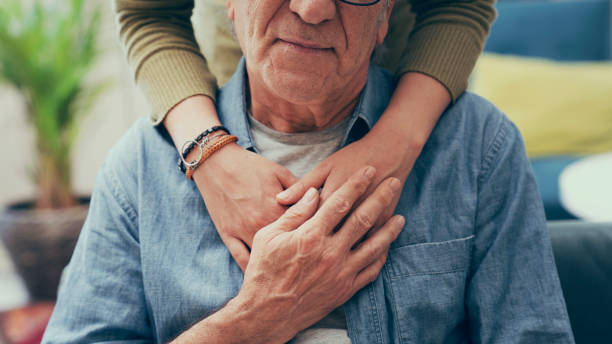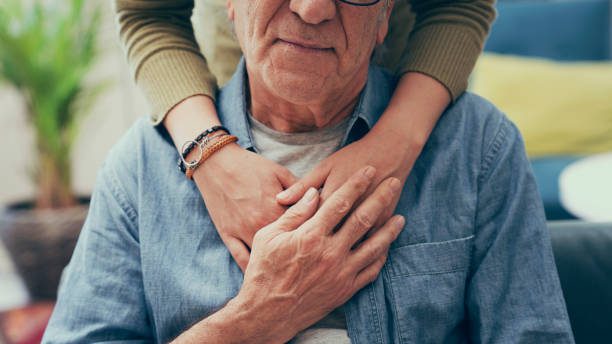Grief is a natural and deeply personal response to loss. For elderly individuals, grief may come more frequently and with added complexities—loss of a spouse, lifelong friends, siblings, or even children can feel especially disorienting. As a loved one, knowing how to offer support through these emotionally challenging times is both an act of love and compassion. This article provides insight into the stages of grief and practical ways to support older adults as they process loss.

Understanding Grief in Older Adults
Grief in the elderly can manifest differently than in younger individuals. Aging often brings about increased physical vulnerability, social isolation, and a heightened awareness of mortality. These factors can amplify the emotional toll of loss.
Unique Challenges Faced by the Elderly
-
Compounded Losses: Elderly individuals often experience multiple losses in a brief period—friends, siblings, or independence.
-
Chronic Health Issues: Physical health problems can intensify emotional distress or limit their ability to express grief.
-
Cognitive Changes: Some may face memory issues or early signs of dementia, complicating how they process grief.
-
Cultural and Generational Norms: Many older adults were raised when emotional expression was less accepted, leading to suppressed grief.
Understanding these nuances is the first step in offering meaningful support.
The Stages of Grief: A Gentle Framework
Psychiatrist Elisabeth Kübler-Ross introduced the five stages of grief: denial, anger, bargaining, depression, and acceptance. While not everyone experiences these stages linearly—or at all—they can serve as a guide for what your elderly loved one might be feeling.
1. Denial
In this initial stage, your loved one might struggle to accept the reality of the loss. It’s a defense mechanism that helps soften the initial blow.
How to Support:
-
Offer a calm presence and gentle reassurance.
-
Avoid pushing them to talk before they’re ready.
-
Allow them time to process and come to terms with the loss.
2. Anger
Anger may surface as your loved one starts to confront the reality of the loss. They might express frustration toward doctors, family members, or even the person who died.
How to Support:
-
Listen without judgment.
-
Validate their feelings: “It’s okay to feel angry. This is a hard time.”
-
Encourage safe outlets for anger, such as physical activity or journaling.
3. Bargaining
During this stage, people often reflect on “what ifs” and “if onlys,” wishing things had been different.
How to Support:
-
Gently remind them that they did the best they could.
-
Avoid offering platitudes or trying to “fix” their pain.
-
Help them focus on meaningful memories and affirmations.
4. Depression
Feelings of deep sadness, hopelessness, or emotional fatigue may set in as the full weight of the loss becomes clear.
How to Support:
-
Check in regularly, especially if they live alone.
-
Encourage small daily routines—eating, getting fresh air, or light exercise.
-
Watch for signs of clinical depression and seek professional help if necessary.
5. Acceptance
This final stage is not about being “over” the loss but rather finding a way to live with it. Your loved one may begin to engage with life again and discover new purpose.
How to Support:
-
Celebrate small steps forward.
-
Support their new routines or social interests.
-
Continue to honor the memory of the loved one together.
Does the Frequent Occurrence of Grief Impact the Physical Health of the Elderly?
Yes, the frequent occurrence of grief in later life can significantly impact the physical health of elderly individuals. As people age, they tend to experience more losses—spouses, close friends, siblings, or even adult children. While grief is a normal emotional response, repeated and unresolved grief can take a toll on the body as well as the mind.
One major concern is the stress response that grief triggers. Intense or prolonged emotional stress can lead to elevated levels of cortisol, a hormone that, when chronically increased, is linked to high blood pressure, heart disease, and weakened immune function. This makes seniors more vulnerable to illness and slower to recover from health setbacks.
Grief can also negatively affect appetite, sleep, and energy levels. Many elderly individuals may experience disruptions in their sleep patterns or lose interest in food, leading to weight loss or malnutrition. Fatigue and lack of motivation can reduce physical activity, which in turn may exacerbate issues like arthritis, balance problems, and cardiovascular health.
Mental health plays a role, too. Depression and anxiety, which often accompany grief, are associated with an increased risk of cognitive decline and chronic illness. In some cases, the loss of a spouse or close companion can lead to what’s known as the “widowhood effect”—a phenomenon where the surviving partner’s risk of death increases, especially within the first six months after a loss.
Overall, grief is not just an emotional burden—it’s a whole-body experience. Recognizing the physical impacts of grief on older adults is critical in ensuring they receive holistic support. Compassionate care, timely medical attention, and emotional support can help mitigate the physical consequences of repeated or unresolved grief in the elderly.

Practical Ways to Offer Support
Knowing what to say or do can feel daunting, but simple, consistent acts of care make a world of difference.
Be Present
Sometimes, your physical presence is more comforting than words. Sit with them, hold their hand, or just be near. These moments of quiet companionship can be deeply healing.
Encourage Expression
Offer safe opportunities for your loved one to talk, cry, or even laugh. Avoid minimizing their pain or rushing them through grief.
Conversation Starters:
-
“What’s been on your mind today?”
-
“Would you like to share a memory about them?”
-
“How are you sleeping these days?”
Help with Daily Tasks
Grief can drain energy and motivation. Offer help with groceries, meals, appointments, or housework. This practical support can ease their burden.
Suggest Professional Support
If your loved one is struggling to function or seems stuck in despair, consider recommending a counselor or grief support group. Many communities have resources tailored for seniors.
Creating Space for Healing and Remembrance
Grieving is not about forgetting—it’s about learning how to carry love forward. Helping your elderly loved one find meaningful ways to honor the person they lost can be a powerful part of the healing process.
Memorial Activities
-
Create a Memory Book: Compile photos, letters, or stories.
-
Visit a Favorite Place: Go to a spot that holds special meaning.
-
Light a Candle Together: Simple rituals can bring comfort.
Reconnecting with Community
Encourage re-engagement with social groups, faith communities, or hobbies. Connection combats isolation and offers distraction in a healthy, constructive way.
Self-Care for the Supporter
Supporting someone through grief can be emotionally taxing. Don’t forget to care for yourself as well.
Know Your Limits
You cannot carry someone else’s grief, only walk beside them. It’s okay to take breaks and recharge.
Seek Support for Yourself
Whether it’s a friend, therapist, or support group, make space for your own emotions as you navigate this journey with your loved one.
When to Seek Additional Help
Some elderly individuals may struggle to move forward because of complicated grief, a condition where intense mourning continues for an extended period and disrupts daily functioning.
Warning Signs:
-
Ongoing depression or withdrawal
-
Substance misuse
-
Neglecting personal care
-
Expressing a desire to join the deceased
If you notice these symptoms, consult with a doctor, counselor, or geriatric care professional. Early intervention can make a meaningful difference.
Conclusion: Walking Alongside, Not Ahead
Grief doesn’t follow a timeline, and there’s no “right” way to mourn. Supporting an elderly loved one through this emotional journey is about being present, patient, and compassionate. It means showing up, listening, and gently guiding them toward healing at their own pace. Your presence, love, and understanding can become one of their most powerful sources of comfort as they learn to live with their loss and find joy again in the life that remains.
